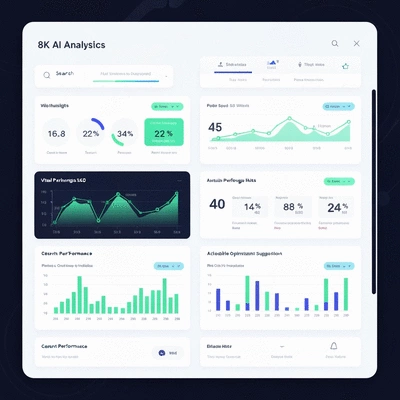What if the secret to skyrocketing your affiliate marketing sales lies in your website's on-site SEO? Understanding the intricacies of search engine optimization can transform how potential customers discover your affiliate products. In this article, we delve into the essential strategies that can enhance visibility and increase conversions.
What You Will Learn
- The key components of on-site SEO, including content optimization, site structure, and technical facets.
- How to effectively use title tags and meta descriptions to boost click-through rates for affiliate links.
- The significance of internal linking for improving user engagement and SEO performance.
- Strategies for conducting keyword research to target high-value and long-tail keywords for niche audiences.
- Best practices for enhancing site speed and mobile optimization, which are crucial for user retention and conversions.
- The importance of implementing structured data to improve search visibility and attract more organic traffic.
- How AI tools can streamline keyword analysis and content creation to drive targeted traffic.
- The need for continual assessment of your SEO strategies using analytics and A/B testing to ensure ongoing success.
On-Site SEO for Affiliate Marketing: Key Strategies and Impact
This visual highlights critical strategies and their impact on enhancing affiliate product visibility and sales, broken down into core components and their benefits.
Defining On-Site SEO
Practices on your website to improve search engine rankings. Focuses on content, site structure, and technical SEO for valuable, relevant content.
- Content optimization
- Site structure & navigation
- Technical SEO (speed, mobile)
Key Optimization Techniques
Optimizing elements for higher ranking and better user engagement, crucial for affiliate product visibility.
- Title Tags & Meta Descriptions
- Internal Linking Strategy
- Enhanced User Experience (UX)
Keyword Research Strategies
Identifying high-value and long-tail keywords to target specific audiences and drive conversions.
- High-Value Keyword Identification
- Long-Tail Keyword Targeting
- Utilizing SEO Tools
Advanced Technical SEO
Implementing structured data, site speed, and mobile optimization for improved search visibility and user experience.
- Structured Data & Rich Snippets
- Site Speed Optimization
- Mobile-Friendliness
AI-Driven SEO Insights
Leveraging AI tools for deeper keyword analysis, content creation, and future-proofing affiliate strategies.
- AI for Keyword & Content
- Future-Proofing with AI
- Measuring Success (Analytics/A/B)
Trustworthiness & Authority
Building domain authority through quality content, backlinks, and audience engagement to boost rankings.
- High-Quality Content
- Backlinks from Reputable Sources
- Audience Engagement
Understanding On-Site Search Engine Optimization for Affiliate Products
In the world of affiliate marketing, the importance of on-site search engine optimization (SEO) cannot be overstated. On-site SEO encompasses the strategies and practices that help enhance a website's visibility on search engines, ultimately driving traffic and sales through affiliate links. As we delve into the intricacies of on-site SEO, it’s essential to understand how it directly influences the success of your affiliate marketing efforts.
At The Stone Builders Rejected, we believe that a strong grasp of on-site SEO principles is crucial for anyone looking to succeed in affiliate marketing. By optimizing your website, you're not only increasing your chances of ranking higher on search engine results pages (SERPs), but also improving the overall user experience for visitors. For a comprehensive guide on how SEO is used in affiliate marketing, you can refer to resources like Digital Rhetoric's strategy guide.
Defining On-Site SEO and Its Relevance to Affiliate Marketing
What is On-Site Search Engine Optimization?
On-site search engine optimization refers to the practices employed directly on your website to improve its search engine rankings. These practices include optimizing content, improving site structure, and ensuring that all technical aspects are in line with search engine guidelines. It’s about creating a seamless experience for your users while signaling to search engines that your content is valuable and relevant.
- Content optimization: Ensuring your content is informative and keyword-rich.
- Site structure: Creating a logical hierarchy that improves navigation.
- Technical SEO: Implementing best practices for speed, mobile-friendliness, and accessibility.
Understanding these components is vital, especially for affiliate marketers who aim to stand out in a crowded digital landscape.
The Role of On-Site SEO in Affiliate Product Visibility
The impact of on-site SEO on affiliate product visibility is profound. When executed correctly, it enhances the likelihood of your affiliate products being discovered by potential buyers. This means strategizing around critical factors such as keyword placement, content quality, and user engagement. It's not just about driving traffic; it's about attracting the right kind of traffic that converts.
By optimizing your site for search engines, you create pathways for potential customers to discover your affiliate links. This is where the synergy between quality content and SEO becomes evident—it’s a game-changer! Interestingly, studies show that affiliate marketing generates a significant portion of online sales, highlighting the importance of effective visibility.

Key On-Page Optimization Techniques to Enhance Affiliate Marketing
Optimizing Title Tags and Meta Descriptions for Affiliate Links
Your title tags and meta descriptions are among the first impressions visitors have of your site. A well-crafted title tag should include the primary keyword and entice users to click through. Similarly, a compelling meta description can significantly impact click-through rates (CTR). This dual focus not only helps with SEO but also aligns with the affiliate marketing goal of maximizing visibility.
- Include primary keywords in both titles and descriptions.
- Keep titles under 60 characters and descriptions under 160 characters.
- Incorporate a call-to-action in meta descriptions to encourage clicks.
By employing these techniques, you're setting the stage for higher engagement rates with your affiliate products.
The Importance of Internal Linking in Affiliate SEO
Internal linking is another powerful on-page SEO technique. It helps to create a strong site structure and allows search engines to crawl your site more effectively. By linking to related content, you not only guide your visitors through a logical flow but also enhance the overall context of your affiliate products.
- Boosts page views by guiding users to additional relevant content.
- Distributes link equity among pages, improving their chances of ranking.
- Reduces bounce rates by keeping users engaged with more of your content.
Incorporating a smart internal linking strategy will not only benefit your readers but also fortify your site's SEO standing.
Enhancing User Experience (UX) with Effective Site Structure and Navigation
Creating a user-friendly site structure is crucial for retaining visitors and encouraging them to explore affiliate offerings. A well-organized website with intuitive navigation enhances user experience, making it easier for potential customers to find and engage with affiliate products.
- Utilize clear categories and subcategories for products.
- Incorporate breadcrumbs to help users understand their navigation path.
- Ensure that all essential links are easily accessible from the homepage.
Remember, a positive user experience not only helps with conversions but impacts your overall SEO rankings.
Effective Keyword Research Strategies for Affiliate Products
Identifying High-Value Keywords for Affiliate Marketing
Keyword research is a cornerstone of successful affiliate marketing. Identifying high-value keywords allows you to tailor your content and optimize your on-site SEO strategies effectively. By focusing on keywords that potential customers are actively searching for, you increase your chances of driving targeted traffic to your affiliate products.
At The Stone Builders Rejected, we understand the nuances of keyword selection, and we encourage you to dig deeper into your niche to uncover those gems. It’s all about aligning your offerings with the needs and interests of your audience!
Leveraging Long-Tail Keywords to Target Specific Audiences
Long-tail keywords are phrases that are more specific and often less competitive than broader terms. By targeting these keywords, you can reach a more defined audience that’s likely to convert. For example, instead of targeting a broad term like “shoes,” consider something like “best running shoes for flat feet.” This specificity can significantly enhance your affiliate marketing efforts.
- Focus on user intent behind specific search phrases.
- Analyze competitors to find gaps in their keyword strategies.
- Use tools like Google Keyword Planner or SEMrush for insights.
By leveraging long-tail keywords, you position yourself as a go-to source for niche interests, which can translate into higher conversions.
Utilizing SEO Tools for Comprehensive Keyword Optimization
To effectively optimize your keyword strategy, consider utilizing various SEO tools available today. These can provide invaluable insights into search volume, competition, and keyword trends, making your research process more efficient and effective.
- Google Analytics: Track user behavior and keyword performance.
- Moz: Access keyword difficulty scores and SERP insights.
- Ahrefs: Discover new keyword opportunities and track rankings.
Equipped with the right tools, you’ll be better positioned to enhance your affiliate marketing strategy and drive more relevant traffic to your site.
Advanced Technical SEO Strategies for Affiliate Marketers
Implementing Structured Data to Improve Search Visibility
Structured data is a powerful tool that can help search engines better understand your content. By implementing schema markup, you can provide additional context about your affiliate products, which can lead to rich snippets in search results. This not only improves visibility but can also enhance click-through rates.
- Use schema markup for products, reviews, and ratings.
- Check your structured data with Google's Rich Results Test tool.
- Keep updated with schema guidelines to stay compliant.
Structured data can give you a competitive edge in the crowded affiliate space.
How Site Speed and Mobile Optimization Impact Affiliate Sales
In today’s digital age, site speed and mobile optimization are more critical than ever. A slow-loading site can lead to high bounce rates, while a mobile-friendly design ensures that users can easily browse your affiliate products on any device. Prioritizing these factors not only enhances user experience but also aligns with Google's ranking criteria.
- Compress images and use browser caching to improve load times.
- Implement a responsive design for optimal mobile viewing.
- Regularly test your site's speed using tools like GTmetrix or Google PageSpeed Insights.
By focusing on speed and mobile optimization, you'll create a more engaging experience for your visitors, increasing the likelihood of affiliate conversions.
Improving Organic Traffic through Schema Markup and Rich Snippets
Rich snippets derived from schema markup can significantly enhance your organic traffic. They provide additional information in search results, making your listings more attractive to potential customers. This increased visibility can lead to higher CTRs and, ultimately, more affiliate sales.
- Incorporate product reviews, pricing, and availability in your schema.
- Monitor performance metrics to assess the impact of rich snippets.
- Stay informed about updates in structured data to leverage new opportunities.
Utilizing these strategies will not only enhance your SEO but also improve your overall affiliate marketing outcomes.

Incorporating AI-Driven SEO Insights into Affiliate Marketing
Using AI Tools for Better Keyword Analysis and Content Creation
Artificial intelligence has transformed the way we approach SEO. By leveraging AI tools, you can conduct deeper keyword analysis and generate content that resonates with your audience. These tools can identify trends, analyze competitors, and even suggest topics that align with your affiliate products.
- Utilize tools like Clearscope and MarketMuse for content optimization.
- Implement AI-driven keyword research tools for comprehensive insights.
- Explore AI-generated content options to support your marketing efforts.
Embracing AI technology can drastically improve your efficiency and effectiveness in affiliate marketing.
Future-Proofing Your Affiliate Strategy with AI Technologies
As AI continues to evolve, staying ahead of the curve is essential. By integrating AI technologies into your affiliate strategy, you position your business for future success. This could mean adopting machine learning algorithms for personalized content delivery or using AI analytics to refine your campaigns based on performance data.
- Explore machine learning for predictive analytics.
- Utilize chatbots for enhanced customer interaction.
- Apply AI insights to continually optimize your strategies.
Future-proofing your affiliate marketing efforts can yield rich dividends as the digital landscape continues to evolve.
Measuring SEO Success with Analytics and A/B Testing
Ultimately, measuring the success of your on-site SEO strategies is vital for ongoing improvement. Utilizing analytics tools allows you to track performance, while A/B testing can help you determine what resonates best with your audience. By regularly assessing your strategies, you can refine your approach and boost your affiliate marketing success.
- Use Google Analytics to monitor traffic sources and user behavior.
- Conduct A/B tests on landing pages to determine effective designs.
- Set specific KPIs to measure your SEO performance.
With the right metrics in place, you can ensure your affiliate products reach their fullest potential.
Real-Life Case Studies: Success Stories in Affiliate SEO
Analyzing Successful Affiliate Campaigns with Effective SEO Practices
One of the best ways to understand the power of on-site SEO is through real-life case studies. By analyzing successful affiliate campaigns, you can see firsthand how effective SEO practices translate into tangible results. Whether it's a blog that optimized its content or an e-commerce site that revamped its structure, these examples can provide valuable lessons.
At The Stone Builders Rejected, we’re always inspired by the stories of those who have successfully navigated the affiliate marketing journey. It reminds us that with the right strategies, anyone can achieve remarkable outcomes!
Lessons Learned from Affiliate Marketing SEO Case Studies
There are countless lessons to be gleaned from affiliate marketing SEO case studies. For instance, many successful campaigns emphasize the significance of ongoing optimization and user feedback. These insights can not only guide your approach but also help you avoid common pitfalls. Some evidence even suggests that poorly executed affiliate marketing can lead to substandard search results, underscoring the need for best practices.
- Prioritize user experience to keep visitors engaged.
- Continuously test and refine your strategies based on data.
- Stay adaptable to changes in search engine algorithms.
Learning from the successes and challenges of others can provide you with a roadmap to your own affiliate marketing success.
Evaluating Conversion Rate Optimization (CRO) Strategies in Affiliate Marketing
Conversion rate optimization (CRO) is a critical aspect of affiliate marketing that focuses on increasing the percentage of visitors who take desired actions, such as clicking on affiliate links. By evaluating effective CRO strategies, you can identify what works best for your audience and tailor your approach accordingly.
- Utilize clear calls-to-action to guide user behavior.
- Test different layouts and content formats to see what resonates.
- Analyze user feedback to make informed adjustments.
By integrating effective CRO strategies into your affiliate marketing efforts, you’ll improve your chances of converting visitors into loyal customers.
Pro Tip
To maximize your affiliate marketing success, consider using content clusters. This strategy involves creating a main pillar page around a broad topic and supporting it with related sub-pages that delve into specific aspects. Not only does this enhance your site's SEO through better internal linking, but it also positions you as an authority on the subject, ultimately driving more targeted traffic to your affiliate products.
Frequently Asked Questions about On-Site SEO for Affiliate Marketing
- Q: What is on-site SEO and why is it important for affiliate marketing?
- A: On-site SEO refers to practices directly on your website to improve search engine rankings. It's crucial for affiliate marketing as it enhances product visibility, drives targeted traffic, and ultimately increases conversions by making your content discoverable to potential buyers.
- Q: How can title tags and meta descriptions improve my affiliate sales?
- A: Well-optimized title tags and meta descriptions act as your content's first impression in search results. By including primary keywords and compelling calls-to-action, they entice users to click, significantly boosting your click-through rates and directing more traffic to your affiliate links.
- Q: What role does internal linking play in affiliate SEO?
- A: Internal linking creates a strong, logical site structure, helping search engines crawl and understand your content more effectively. It guides users to relevant content, distributes link equity across your pages, and keeps visitors engaged, all of which contribute to better SEO performance and user experience.
- Q: How do long-tail keywords benefit affiliate marketers?
- A: Long-tail keywords are more specific and often less competitive phrases that attract a highly targeted audience with a clear intent. By focusing on these, affiliate marketers can reach users who are closer to making a purchase, leading to higher conversion rates and positioning the site as an authority in niche areas.
- Q: Why are site speed and mobile optimization critical for affiliate products?
- A: In today's mobile-first world, slow site speed and a non-responsive design can lead to high bounce rates and a poor user experience. Optimizing for speed and mobile-friendliness ensures that users can easily access and engage with your affiliate products on any device, which is essential for user retention and improved search engine rankings.
- Q: How can AI tools enhance my affiliate marketing SEO strategy?
- A: AI tools can significantly improve keyword analysis by identifying trends and competitor gaps. They can also assist in content creation, suggesting topics and optimizing content for relevance and engagement. Embracing AI helps future-proof your strategy by providing deeper insights and more efficient processes for targeted traffic generation.
Summarizing the Impact of On-Site SEO on Affiliate Product Performance
As we wrap up our discussion on on-site SEO for affiliate products, it’s essential to recognize how critical these strategies are for enhancing visibility and driving sales. Effective on-site SEO isn't just a checklist; it's a dynamic approach that can transform your affiliate marketing efforts into a successful venture.
By optimizing various elements of your website, you can significantly improve how search engines perceive your content and how users engage with it. This ultimately leads to better performance in terms of conversions and sales. Here are the key strategies we discussed:
- Utilizing targeted title tags and meta descriptions
- Enhancing user experience through streamlined navigation
- Incorporating long-tail keywords for specific audience targeting
- Implementing structured data to boost search visibility
Each of these components plays a vital role in crafting a robust affiliate marketing strategy, helping to position your products effectively within search results.
Encouraging Action: Implementing On-Site SEO for Affiliate Success
Now that we've outlined the fundamental strategies, it’s time for action! Implementing on-site SEO techniques can seem daunting, but it’s a worthwhile investment in your affiliate marketing journey. Start by auditing your current website and identifying areas for improvement. Keep these steps in mind:
- Review and optimize your title tags and meta descriptions.
- Ensure your site structure is user-friendly and promotes easy navigation.
- Conduct keyword research to uncover valuable long-tail keywords.
- Implement structured data to enhance search result displays.
Remember, taking small, actionable steps today can lead to substantial improvements in your affiliate product performance tomorrow. Let’s work together to create a winning strategy!
The Role of Trustworthiness and Domain Authority in Affiliate Marketing
As you embark on your SEO journey, it’s crucial to consider the importance of trust and domain authority in affiliate marketing. Search engines prioritize websites that are viewed as credible and trustworthy. Building your site’s authority hinges on several factors:
- Publishing high-quality, relevant content
- Obtaining backlinks from reputable sources
- Engaging with your audience through social media and other platforms
By focusing on these aspects, you can enhance your site's credibility, which in turn boosts your rankings and increases your chances of successful affiliate conversions. At The Stone Builders Rejected, we believe that a trustworthy approach is foundational to any marketing strategy, and it’s this principle that guides our content as we provide you with insights.
Recap of Key Points
Here is a quick recap of the important points discussed in the article:
- Utilize targeted title tags and meta descriptions to improve click-through rates.
- Enhance user experience through streamlined navigation and clear site structure.
- Incorporate long-tail keywords for specific audience targeting to drive relevant traffic.
- Implement structured data to boost search visibility and enhance rich snippets.
- Regularly measure SEO success through analytics and A/B testing for continual improvement.






